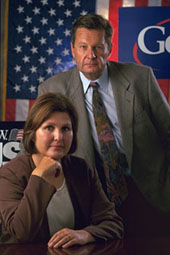AMES, Iowa -- Arizona Republican Sen. John McCain's recent visit to Cedar Falls makes him the ninth prospective presidential candidate to visit Iowa, which is expected to once again host the lead-off nominating caucuses less than 18 months from now.
Among those presidential hopefuls is Iowa's own Gov. Tom Vilsack, possibly giving the Democratic caucus a much different dynamic than past caucuses.
"The question is 'If he (Vilsack) runs, does that mean that other Democrats are going to bypass Iowa?' because they're going to say 'Well it's not worth it, he's the favorite son and so I'm not going to waste my money there.' And I think the answer this time around is 'No' --they're not going to do that," said Steffen Schmidt, University Professor of political science at Iowa State.
Schmidt says Vilsack may not have the high profile of some of leading Democratic hopefuls -- and he came in fourth in the first poll of potential candidates by The Des Moines Register -- but he could still make a strong run.
"Was Jimmy Carter really a viable candidate for president? The answer was, at that time, no. He was an unknown from Georgia," Schmidt said. "Carter made himself viable, and the Iowa Caucuses are a process by which you make yourself viable, or you burn out and show yourself not capable of going on -- which happened to (Howard) Dean.
"Vilsack has had very good feedback and excellent reception in places other than Iowa -- especially New Hampshire."
Schmidt says that's because Vilsack "has a very interesting personal story to tell, and he apparently is genuinely religious." But in order to gain momentum in his home state for a presidential bid, he'd likely have to oppose former first lady and Sen. Hillary Rodham Clinton (D-NY), who many experts have predicted will be the Democratic favorite.
The Hillary factor
A run to become the Democratic Party's first female presidential nominee won't be easy, but Clinton is in a strong position, according to Dianne Bystrom, director of the Carrie Chapman Catt Center for Women and Politics at Iowa State University.
"She's leading in all the (national) polls right now -- both among all Democrats and likely to vote Democrats," said Bystrom, who authored a chapter for the 2003 book "Anticipating Madam President".
"Hillary Rodham Clinton has been making some moves to position herself at the middle of the party. That makes some people mad because they feel that she has positioned herself to seem more moderate. But positioning yourself as a moderate makes sense politically, particularly in a general election," Bystrom continued. "Certainly, right now, she would be considered the front-runner. To me, this is the closest our nation has come -- at least in the pre-election buzz -- toward really touting a woman as a presidential candidate. Whether that pans out or they decide to go with someone less risky, remains to be seen. That's because Hillary Clinton will generate a lot of votes, but she'll also generate a lot of opposition, too."
Clinton's campaign could use a better start in Iowa than 2004 front-runner Dean, whose campaign both started and largely ended in the state. Clinton has yet to visit Iowa as a presidential hopeful, but there may be a reason for that.
"I don't think she's made up her mind yet, because if she had made up her mind, she would have been here," said Bystrom. "Again, I think because of her notoriety in some respects, she's probably more careful about coming here than other candidates. I think she knows that if she steps foot in the state -- unless she's campaigning for someone else -- the speculation will be that she's running, even if she says that she's not running. And I think she is wise to be timely about that."
Winning Iowa hearts and minds
At this stage, candidates may not need as much "face time" in Iowa as they do a strong campaign organization.
"In the caucuses, you don't have to win the hearts and minds of Iowans. All you have to do is have a very well-organized machine to convince those few people who go to the caucuses, and win their hearts and minds -- and that's a very small number of people," said Schmidt, who is also host of "Dr. Politics," a weekly political call-in show on WOI-AM, a National Public Radio affiliate. "So organization is incredibly important, because you've got to get those people (who support their candidate) to turn out on caucus night. And you have to read the ideological tea leaves of party activists -- not of general voters in Iowa, or essentially the majority of Iowa."
Schmidt anticipates the 2008 field of presidential candidates to be much larger than it's been in most years.
